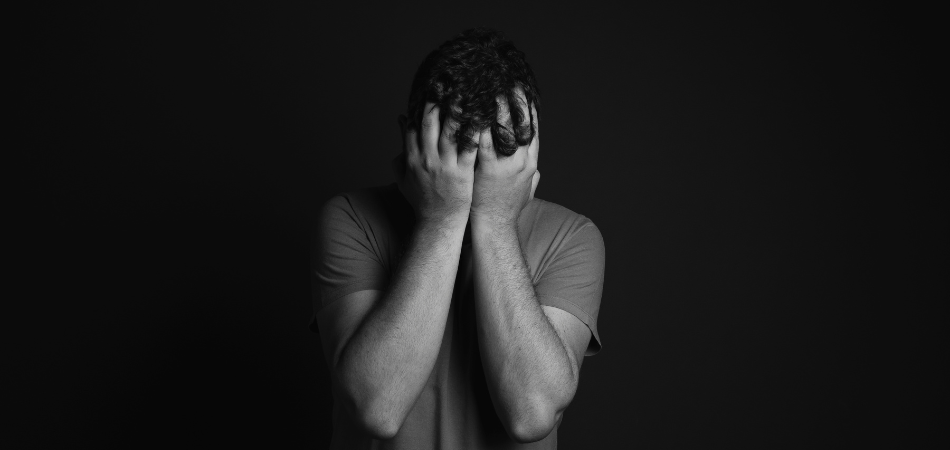
Written by:

Medically Reviewed by:
Last Updated:
April 10th, 2025
Depression and addiction
Depression and addiction are two highly painful and challenging disorders that often go hand-in-hand, with the conditions often fuelling each other and leading to vicious cycles of harmful behaviour. A dual diagnosis of depression and addiction is especially complex and can at times feel impossible to manage on your own but thankfully there is a light at the end of the tunnel.
Liberty House can help you to overcome your addiction, while at the same time supporting co-occurring depression. If you are tired of feeling trapped and are ready to start enjoying life again, contact our admissions team today.
What is depression?
Depression is unfortunately a very common mental health disorder. It affects 5% of the world’s population and is the number one cause of disability. This disorder is characterised by persistent feelings of sadness, hopelessness and despair. If you are suffering from depression, you may have lost interest in things you used to enjoy and struggle to function normally day-to-day. When this is the case, it becomes increasingly possible that you end up turning to substances as a way to cope with your symptoms.
Everyone experiences periods of sadness in their life but depression refers to feelings of inescapable despair which may last two weeks or more. There are many factors that can contribute towards someone getting depression and these can be physical, environmental or a combination of the two. Some circumstances that may cause depression include:
- Experiencing a stressful or traumatic event such as a bereavement, the loss of a job or the breakdown of a relationship.
- Being genetically predisposed or having certain personality traits. For example, those who tend to be overly self-critical are more likely to develop depression.
- Feeling lonely, isolated or cut off from family and friends.
- Experiencing an illness or chronic condition.
- Having an imbalance of certain chemicals in the brain which contribute towards symptoms of depression.
- Post-natal depression is also extremely common in women who have just had a baby due to changes in hormone levels.
Equally, all of these risk factors can also lead to substance abuse, meaning that depression and addiction are often intrinsically linked. In many cases, it can be difficult to determine which condition came first and which came as a result of the primary condition.
Why are depression and addiction linked?
Addiction is defined as an inability to control your consumption of harmful substances or behaviours, continuing to engage with them despite the negative consequences they may be having on health and wellbeing. A serious condition, addiction can cause lasting damage if left untreated, and in some cases, individuals can suffer long-term mental health issues as a result of their dependence. Studies have demonstrated a high prevalence of mental health issues like depression occurring alongside addiction, with 63% of those in treatment for addiction also requiring help with their mental health. But why is there such a strong link between these two conditions?
There are a number of reasons why this dual diagnosis is so common. Firstly, depression is a known side effect of substance abuse. Whether you are addicted to alcohol, illicit drugs or prescription drugs, all have the potential to cause depression as they impact your brain’s natural levels of neurotransmitters like dopamine and serotonin. Although substances may produce a feel-good ‘high’ initially, the next day these brain chemicals will be depleted, leaving you feeling down and depressed.
Many who suffer from depression may also turn to substances as a way to self-medicate. For example, if you have experienced a traumatic event resulting in depression, drinking alcohol can feel like a way to escape and numb the pain. This can quickly spiral out of control and lead to addiction as you continually attempt to escape the reality of your mental health condition.
Ultimately, the symptoms of depression and addiction feed off of each other, working together to keep you imprisoned in a damaging cycle of substance abuse. Don’t allow these conditions to take over your life – our team can provide you with the resources you need to break free.
Signs and symptoms of depression and addiction
While the symptoms of depression and addiction can vary from person to person, it is important to be aware of any signs that may be indicative of a problem. These signs may include:
- Anger, irritability and mood swings
- Changes in energy levels
- Insomnia or hypersomnia
- Extreme fatigue
- Restlessness
- Inability to concentrate
- Changes in appetite
- Decreased self-esteem or self-worth
- Loss of interest in previously enjoyed activities
- Withdrawal from friends and family
- Feelings of guilt or shame
If you have noticed any of these signs in yourself or a loved one, finding the right help is crucial. Treating depression and addiction requires expert knowledge and experience of both conditions in order to be effective.
How is depression and addiction treated in rehab?
Liberty House can help you to conquer your addiction, as well as support co-occurring mental health issues like depression. While we do not target depression specifically in treatment, our extensive programme and range of holistic activities have proven highly beneficial in addressing underlying disorders like this.
During addiction rehab, you will be involved in three main stages of recovery. This includes detox, rehabilitation and aftercare. The detox phase focuses on the physical withdrawal from drugs or alcohol. Rehabilitation and addiction counselling, on the other hand, concentrates on the root causes of your addiction and the psychological healing that needs to take place – it is during this stage of recovery that you will analyse the thoughts, feelings and behaviour that propel you towards substances. This will also help you to manage your symptoms of depression.
At Liberty House, we use a wide range of therapies designed to help you understand and cope with your depression and addiction. These include:
- Dialectical behaviour therapy (DBT)
- Group therapy
- Family therapy
- Solution-focused therapy
- Mindfulness-based therapy
- Mutual aid and self-help
- Relapse prevention
- Sound therapy
- Art therapy
- Yoga and meditation
Aftercare is equally as important as rehab, as it allows you to continue working on your depression and addiction recovery once you have returned home. Attending weekly meet-ups and therapy sessions will help to prevent those feelings of isolation and loneliness from creeping back. It means you will have access to a support network of peers who truly understand what you are going through, giving you the motivation and power, you need to remain sober.
Helping a loved one with depression and addiction
Watching a family member or partner suffer from depression and addiction is incredibly distressing. Of course, you will want to ease their pain in any way you can, but you may be feeling unsure of what to say and do. There are ways that you can help, though, and this could be the starting point your loved one needs to get help.
Some things you can do to help a loved one suffering from depression and addiction include:
-
- Educate yourself on both conditions
- Research reputable rehab centres experienced in both depression and addiction
- Realise that while depression and addiction are treatable, there is no “cure”
- Remain supportive, understanding and gentle when conversing with your loved one
- Maintain honest conversations about depression and addiction
- Offer to drive your loved one to support groups, therapy or rehab
- Be open to attending family therapy sessions
- Suggest and plan activities that you both enjoy
As a family member or friend, you can play a vital role in your loved one’s recovery by providing support, encouragement and a listening ear.
A life without depression and addiction
Depression and addiction can be debilitating, robbing people of their ability to find joy in life, but freedom from these conditions is possible and the benefits are substantial. Rehab treatment can help you to understand your triggers, manage stress and negative emotions and develop healthy coping mechanisms. As a result, you will begin to feel better both physically and mentally, your relationships will start to improve and you will have more energy to pursue the things you enjoy. A life without depression and addiction may seem impossible, but the right treatment programme can help you start living the life you deserve.








